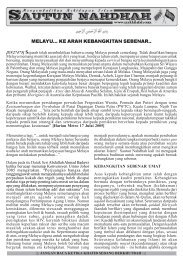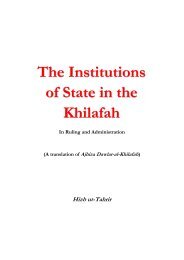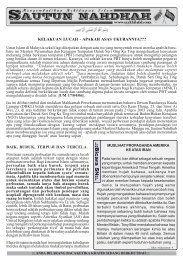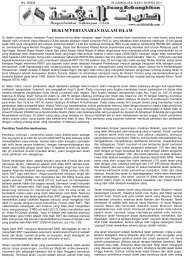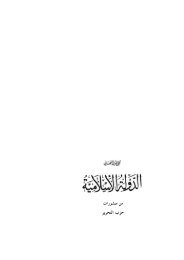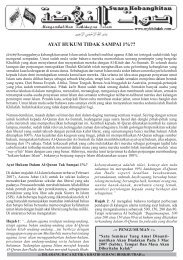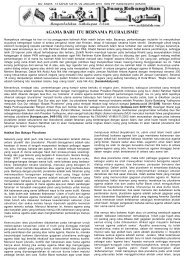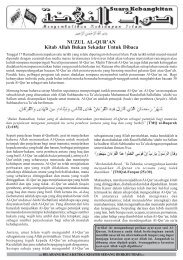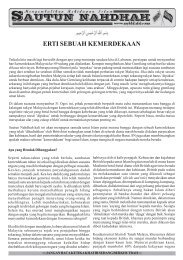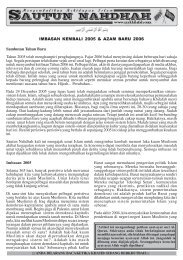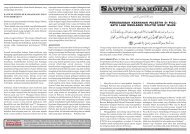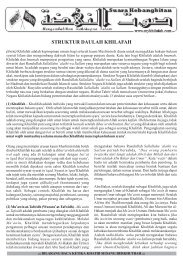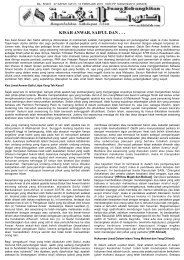A Warm Call from Hizb ut-Tahrir to the Muslims - MyKhilafah.com
A Warm Call from Hizb ut-Tahrir to the Muslims - MyKhilafah.com
A Warm Call from Hizb ut-Tahrir to the Muslims - MyKhilafah.com
You also want an ePaper? Increase the reach of your titles
YUMPU automatically turns print PDFs into web optimized ePapers that Google loves.
30 u A <strong>Warm</strong> <strong>Call</strong> <strong>from</strong> <strong>Hizb</strong> <strong>ut</strong>-<strong>Tahrir</strong> <strong>to</strong> <strong>the</strong> <strong>Muslims</strong><br />
and abstaining <strong>from</strong> causing harm <strong>to</strong> o<strong>the</strong>rs unlawfully. As an example<br />
for that is when a farmer negligently allows his cattle <strong>to</strong> graze on <strong>the</strong><br />
crops of his neighbour; and <strong>the</strong> unsubstantiated profiteering that<br />
prevents a person <strong>from</strong> benefiting on <strong>the</strong> account of ano<strong>the</strong>r person,<br />
such as building a house on o<strong>the</strong>rs' property, or paying a debt that does<br />
not exist, i.e. <strong>the</strong> f<strong>ut</strong>ile work. All of this disagree with <strong>the</strong> Theory of<br />
Liability and indicate its invalidity. These issues and matters do restrict<br />
and contradict <strong>the</strong> right in personam and destroy it, in <strong>the</strong> sense that it<br />
is an absol<strong>ut</strong>e or unrestricted right. However, according <strong>to</strong> <strong>the</strong> Capitalist<br />
viewpoint, liability as already described, is established upon a legal bond<br />
between <strong>the</strong> credi<strong>to</strong>r and <strong>the</strong> deb<strong>to</strong>r that obliges <strong>the</strong> individual <strong>to</strong> transfer<br />
or carry a right. This meant <strong>the</strong> absence of stipulating <strong>the</strong> acceptance of<br />
<strong>the</strong> bill of exchange or promissory. In o<strong>the</strong>r words, it initiates a<br />
promissory witho<strong>ut</strong> <strong>the</strong> acceptance of <strong>the</strong> individual involved in <strong>the</strong><br />
transfer. It also means <strong>the</strong>re is no stipulation that <strong>the</strong> credi<strong>to</strong>r accepts <strong>the</strong><br />
transference of <strong>the</strong> debt, because <strong>the</strong> legal implication is that <strong>the</strong> person<br />
is obliged <strong>to</strong> transfer <strong>the</strong> right as an asset or liability, a matter which<br />
would not guarantee fairness and equity. Simply informing <strong>the</strong> person on<br />
whom <strong>the</strong> liability has been transferred is not sufficient, it is necessary<br />
that he accepts it, because <strong>the</strong> contract in <strong>the</strong> bill of exchange is valid<br />
only if all signa<strong>to</strong>ries <strong>to</strong> <strong>the</strong> contract accept it.<br />
This is a summary of <strong>the</strong> renewed problems faced by <strong>the</strong> Theory of<br />
Liability; <strong>from</strong> which it can be seen that this <strong>the</strong>ory cannot be a basis for<br />
thought. There are many different relationships between people that<br />
cannot be deduced on <strong>the</strong> basis of this <strong>the</strong>ory, like <strong>the</strong> fact that any<br />
fraud would invalidate <strong>the</strong> contract. It also has no scope for<br />
generalisation, because responsibility for assumed errors such as injury<br />
incurred <strong>from</strong> use of machinery at work, bill of exchange, or <strong>the</strong> benefit<br />
of o<strong>the</strong>r parties such as insurance taken for <strong>the</strong> benefit of as yet unborn<br />
children, <strong>the</strong> individual will, such as <strong>the</strong> charitable endowment, even <strong>the</strong><br />
Capitalist share <strong>com</strong>pany, and <strong>the</strong> similar contracts and transactions;<br />
none of <strong>the</strong>se are included in <strong>the</strong> Theory of Liability nei<strong>the</strong>r in its<br />
wording or meaning. The <strong>the</strong>ory is also unsuitable for many general<br />
rules such as fraud in contracts, or not spending on what disagrees with<br />
morals and public order. It does not have <strong>the</strong> capacity <strong>to</strong> unify <strong>the</strong><br />
different peoples and cultures in single legislation, as evidenced by its<br />
inadequacy when <strong>the</strong> <strong>the</strong>ories of Socialism emerged and <strong>the</strong> industrial<br />
revol<strong>ut</strong>ion happened. It is also wrong <strong>from</strong> its basis, because it is built on<br />
A <strong>Warm</strong> <strong>Call</strong> <strong>from</strong> <strong>Hizb</strong> <strong>ut</strong>-<strong>Tahrir</strong> <strong>to</strong> <strong>the</strong> <strong>Muslims</strong> u 31<br />
<strong>the</strong> twin concepts of personal freedom and <strong>the</strong> freedom of ownership;<br />
and <strong>the</strong>se two freedoms cause corruption amongst <strong>the</strong> people, and<br />
facilitate exploitation and imperialism. This is because <strong>the</strong> law, which<br />
protects granting <strong>the</strong>se two freedoms, was built on <strong>the</strong> Theory of<br />
Liability, a matter that causes corruption and suffering.<br />
This is <strong>the</strong> reality of <strong>the</strong> Western legislation that challenged <strong>the</strong> Islamic<br />
legislation. In o<strong>the</strong>r words, this is <strong>the</strong> reality of <strong>the</strong> Capitalist system<br />
that challenged <strong>the</strong> Islamic system. As for <strong>the</strong> Islamic legislation attacked<br />
and severely criticised by <strong>the</strong> Western legislation, it is not built upon<br />
speculative <strong>the</strong>ories <strong>from</strong> which rules and sol<strong>ut</strong>ions emanate, as it is <strong>the</strong><br />
case with <strong>the</strong> Western legislation. Ra<strong>the</strong>r, it emanates <strong>from</strong> a definite<br />
creed that is not open <strong>to</strong> doubt. Its origin is not a <strong>the</strong>ory of right, nor<br />
it emanates <strong>from</strong> <strong>the</strong> right in personam and <strong>the</strong> right in rem. Ra<strong>the</strong>r, its<br />
origin is a decisive ‘Aqeedah (creed) that is reached by <strong>the</strong> mind and<br />
definitely believed in. Thus, whatever emanates <strong>from</strong> this creed is an<br />
Islamic legislation and whatever does not emanate <strong>from</strong> it is not Islamic<br />
legislation. So which of <strong>the</strong>se is <strong>the</strong> correct legislation Is it <strong>the</strong><br />
legislation that originates <strong>from</strong> a rational creed that is not open <strong>to</strong> any<br />
doubt, or <strong>the</strong> legislation derived <strong>from</strong> speculative <strong>the</strong>ories, particularly<br />
when errors began <strong>to</strong> appear in <strong>the</strong>se <strong>the</strong>ories, as <strong>the</strong>y were faced with<br />
new events, beside <strong>the</strong> fact that <strong>the</strong>ir definition proved its disagreement<br />
with <strong>the</strong> tr<strong>ut</strong>h and reality<br />
The Islamic legislation emanates <strong>from</strong> <strong>the</strong> Islamic ‘Aqeedah, i.e. <strong>from</strong><br />
<strong>the</strong> belief in Allah , His Angels, His Books, Messengers, and <strong>the</strong> Last<br />
Day. In o<strong>the</strong>r words, it emanates <strong>from</strong> <strong>the</strong> Book and <strong>the</strong> Sunnah, which<br />
have been decisively proven through rational thought as revelation <strong>from</strong><br />
Allah . Whatever has been unders<strong>to</strong>od <strong>from</strong> <strong>the</strong> revelation in terms of<br />
evidences, principles and rules constit<strong>ut</strong>es Islamic legislation. Therefore<br />
when Islamic legislation is studied or when Islam is studied as such, it is<br />
studied on <strong>the</strong> basis that it is revelation <strong>from</strong> Allah and not <strong>the</strong><br />
product of human beings. This is <strong>the</strong> basis in <strong>the</strong> issue of studying Islam<br />
and <strong>the</strong> basis of <strong>the</strong> viewpoint <strong>to</strong>wards Islam. Therefore <strong>the</strong> decisive<br />
rational proof must be established that Islam is revelation <strong>from</strong> Allah ,<br />
<strong>the</strong>n <strong>the</strong> legislation is adopted <strong>from</strong> what has <strong>com</strong>e in <strong>the</strong> revelation i.e.<br />
<strong>from</strong> that which has been established by <strong>the</strong> decisive rational proof that<br />
Allah has revealed as a system for mankind. Islam has been revealed<br />
by Allah , for it is what has been brought by <strong>the</strong> Qur'an and by <strong>the</strong><br />
1<br />
2<br />
3<br />
4<br />
5<br />
6<br />
7<br />
8<br />
9<br />
10<br />
11<br />
12<br />
13<br />
14<br />
15<br />
16<br />
17<br />
18<br />
19<br />
20<br />
21<br />
22<br />
23<br />
24<br />
25<br />
26<br />
27<br />
28<br />
29<br />
30<br />
31<br />
32<br />
33<br />
34<br />
35<br />
36<br />
37<br />
38<br />
39



